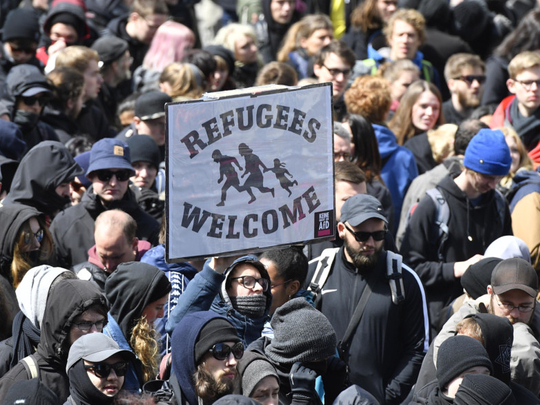
Faithfully adhering to its “special responsibility” to the world’s persecuted and downtrodden people, especially after the horrors of Holocaust perpetrated by the Nazis against millions of Jews in death camps and gas chambers, Germany maintained an ‘open door’ policy towards refugees after the Second World War.
Indeed, Germany’s post-Second World War constitution even had an enshrined article providing admittance to persecuted people and refugees on its soil. The country’s politicians, by and large, adhered to this policy, defying calls to drastically amend the article to stem what some critics called “the refugee tidal wave lashing German shores”.
An icy wind is today blowing across the country that is forcing politicians to re-think the refugee policy, which has come under massive assault and led to the rise of populist, right-wing parties that portray refugees, immigrants and, generally, foreigners, mainly from North Africa and the Middle East, as responsible for the surge in crime, rape cases and violence in the country.
Although Chancellor Angela Merkel’s initial reaction to allow refugees into Germany was motivated by compassion, after watching images of weeping infants lost or injured in the crossfire of the Syrian war — the horrifying picture of the dead body of a two-year old boy washed ashore on the beach touched the German nation — her action later became unpopular as German citizens began feeling uncomfortable in their own country which, as one critic put it, was “swamped by people belonging to an alien religion, culture and sense of ethical behaviour”.
Sexual assaults, terror attacks
However, the straw that finally broke the camel’s back came in the form of sexual assaults by groups of North Africans and Arabs on German women on 2015 New Year’s Eve in Cologne; the country also recently had its share of terrorist attacks by young Muslims. These incidents added fuel to the fire and soured Germany’s so-called ‘welcoming culture’. Only 37 per cent of those surveyed in a recent poll said that Germany can and should take in more refugees on humanitarian grounds, posing a sharp contrast to a 2015 poll when every second German welcomed foreign refugees.
But the German government could pro-actively assimilate the huge numbers of refugees and migrants into an efficient nation-building workforce. Germany has been slow in this context despite the labour shortages it faces. The first of the estimated 1.2 million refugees and migrants who arrived in Germany in 2015 and 2016 from countries including Syria, Iraq and Afghanistan are starting to enter the labour market. About 14 per cent already have jobs.
The number of native Germans entering the workforce is slowing down because of an ageing population, thus opening up a demographic hole which, pundits say, can be filled by refugees. Germany is simplifying, though slowly, the bureaucratic procedures to make it easier for asylum-seekers to enter the workforce; for example, most can now access the labour market just after three months compared to nine months previously, and as long as a year in Britain.
But about 30 per cent of those who arrived in the first half of 2016 had no formal schooling or had only attended primary school and fewer than 20 per cent had a university degree. Iranians and Syrians had the highest levels of education. More than three quarters of the employers who took part in a survey jointly conducted by the Association of German Chambers of Commerce and Industry and the German Labour Ministry, said they had little or no difficulty in daily work with the refugees they had hired.
The number of people applying for asylum in Germany in the first quarter of 2017 has sharply declined, a sign that a deal between the European Union and Turkey to stem the flow of migrants is working.
The EU’s year-old agreement with Turkey to stop the influx of migrants at the Turkish borders and prevent them from entering the EU has helped Merkel to regain some of her lost popularity with the public. Conversely, declining arrivals have also seen support for the far-right anti-immigrant Alternative for Germany (AfD) party plunge in recent polls. Immigration and security, which are being played up by AfD and other elements, will figure prominently in the September election.
Investing in training
Around 47,300 people arrived in Germany between January and March 2017, mostly from Syria, Iraq and Afghanistan, compared to 60,000 who applied for asylum in the year-earlier period. To offset the pressure on her, Merkel said refugees in Germany must respect German laws, tolerance, openness and freedom of religion. But she also urged Germans to show openness and reach out to refugees and migrants.
One way to assuage public tempers is to transform the refugees and migrants into a viable workforce for the German industry, which has a voracious appetite for labour. But Germany needs to invest in training, educating and inculcating values of law and order, including German language classes, among the new arrivals to assimilate them in society. Once the migrants start contributing to the economy, the screams of critics and populists will fall on deaf ears.
Merkel and her party have a good chance of being re-elected in the September election, but they need to aggressively work towards integrating the migrants into the economy and German society. Integration is the mantra that can help convert the huge numbers of migrants into assets.
Manik Mehta is a New York-based journalist with extensive writing experience on foreign affairs, diplomacy global economics and international trade.









